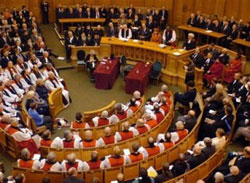Queen to speak at General Synod
The Queen will attend a service at Westminster Abbey and then deliver a speech at Church House this morning to inaugurate the General Synod, the governing body of the Church of England.
The Queen, who is Supreme Governor of the church, will be accompanied by the Duke of Edinburgh.

The Archbishop of Canterbury Justin Welby will preside during the Eucharist service in Westminster Abbey and Father Raniero Cantalamessa, preacher to the Papal Household, will preach.
The synod, a law-making body, is re-elected every five years. After decades debating women's ordination, the next challenge facing the newly-elected members is the question of how the Church deals with society's changing mores on homosexuality.
Early indications are that the synod is polarised on the issue, with significant numbers of liberals in favour of gay marriage elected as well as conservatives who are opposed.
Asked in questions last night about choosing future leaders who have spoken out against, as well as those who have spoken out in favour of, a change in the Church's teaching the issue, the Archbishop of York Dr John Sentamu quoted recently published guidelines. "The mere fact that a candidate had questioned the Church of England's teaching on human sexuality... would not be sufficient to raise any issue from this point of view: that is something that clergy are free to do. An issue could only arise as a result of the way in which that disagreement had been expressed."
He added: "It would be misleading to regard those who have spoken out in favour of the Church's teaching as simply the mirror image of those who have opposed it. But bishops do need to be a focus of unity and so the manner and content of any candidate's public statements are something that those making an appointment can properly weigh."
The synod also heard last night that the turnout in the elections held earlier this autumn was "depressingly low". The turnout was under 50 per cent for the House of Laity election in 22 of the 33 dioceses that have posted the figures on their websites, and under 40 per cent in four dioceses, Manchester, Oxford, Peterborough and Salisbury. The synod was asked to consider bringing forward legislative proposals for online voting in 2020.











